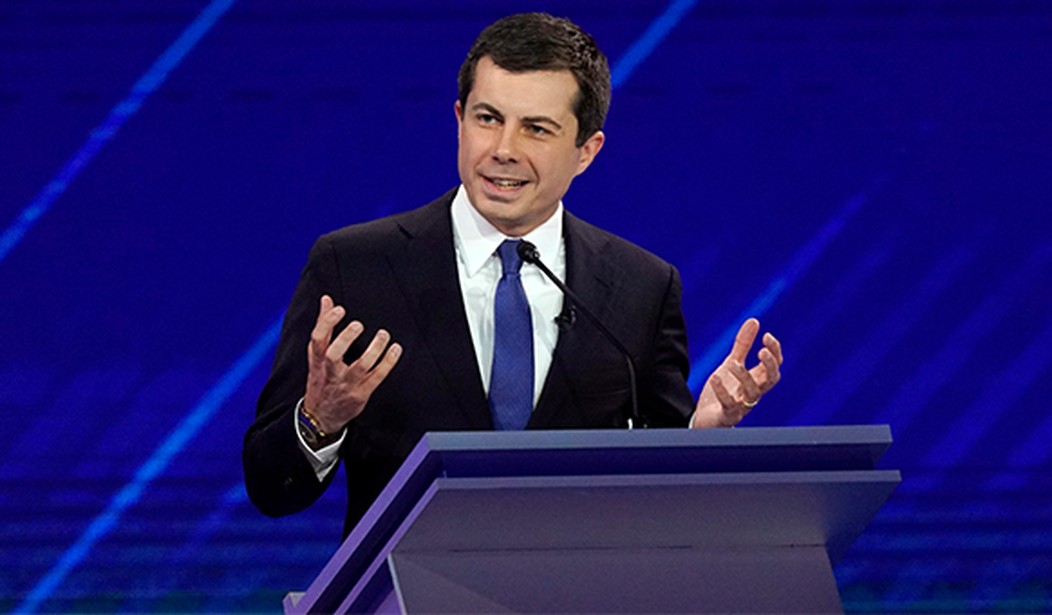If you got strong Marie Antoinette vibes from Pete Buttigieg’s House testimony yesterday, his appearance today on CNBC’s Squawk Box will amplify them considerably. The Transportation Secretary told Rep. Carlos Gimenez (R-FL) that the more we experience “pain” from high gas prices, “the more benefit there is for those who can access electric vehicles.”
Gimenez was left agog at that statement, which Buttigieg then turned into a pitch to subsidize the purchase of EVs, which cost significantly more than internal-combustion vehicles. Gimenez nearly choked on Buttigieg’s claim that subsidies lower actual cost:
REP. GIMENEZ: But you’d agree that the higher the price of gas, then the faster you reach that parity?
BUTTIGIEG: Of course. The more pain that we are all experiencing from the high price of gas, THE more benefit there is for those who can access electric vehicles. That’s why we’re hoping you and your colleagues might reconsider opposing the reduction of UV upfront prices with tax credits.
GIMENEZ: So, you’re saying, the more pain we, have the more benefit we’re going to get? I think that’s what I heard you say. You said the more pain —
BUTTIGIEG: That’s what you heard me say?
GIMENEZ: That’s what I heard you say.
BUTTIGIEG: I know you want me to say it so bad. But honestly, sir, what we’re saying is that we could have no pain at all by making EVs cheaper for everybody. And we would love to have your support on that.
GIMENEZ: Make EVs cheaper by subsidizing them?
BUTTIGIEG: That’s part of it.
GIMENEZ: That doesn’t make them cheaper.
BUTTIGIEG: Well, actually, it does.
No, actually, it doesn’t. It just transfers part of the cost to taxpayers, as it has all along. The federal government has subsidized electric vehicle purchases through tax credits for years, and in fact still does, up to $7500 per vehicle purchased. Even with that substantial subsidy and all sorts of policy and cultural pressure to support that industry, it’s still more expensive to buy an EV.
And the big message from this exchange, of course, is that Buttigieg and Joe Biden are driving up the cost of gasoline deliberately — or are at the very least cheering it. They want gas to go up in price rapidly to force people away from grid-independent vehicles, despite the fact that we’re also restricting the fuels that give us the most elasticity in electricity production: oil, natural gas, coal, and nuclear power. The “incredible transition” is a deliberate policy choice, just as it was in the Obama administration, to punish Americans who refuse to trust their mobility to an electrical grid that’s already unable to keep up with the current demand (pardon the pun), let alone the drain that will take place when the EVs start getting connected in large numbers:
Rep. Massie tells Pete Buttigieg that if the average household plugged in electric cars, it would take 4x more electricity to charge the cars as would be used on air conditioning. pic.twitter.com/Bd4lSo5BKX
— The Post Millennial (@TPostMillennial) July 19, 2022
With consumers facing shortages of electricity, is it any wonder that they’re reluctant to plug in for their individual mobility choices? It is to Buttigieg, who proclaimed himself “astonished” that Americans won’t choose the Biden administration’s “incredible transition” over the status quo, even with higher gas prices:
Pete Buttigieg says he's "astonished" that "some folks seem to really struggle to let go" of their gas-powered vehicles in favor of electric vehicles pic.twitter.com/BPKzV9v3eP
— RNC Research (@RNCResearch) July 20, 2022
I’m hardly astonished at Buttigieg’s astonishment. He’s in the same Acela-corridor bubble as Joe Biden, Barack Obama, and others who think that policy-driven punishment will be blithely accepted by the masses. It didn’t work in Obama’s administration and it certainly didn’t last, as Trump reset energy policy back to a rational basis and ensured a rational price for gasoline — even while the subsidies for EVs remained in place.
If people want EVs, they’ll buy them. I’d consider buying one myself, if it wasn’t for the fact that the same elitist officials that want to punish us with high gas prices also want to strip us of every scalable source for electricity production at the same time. When Buttigieg and Biden get serious about scaling up electricity production to meet current demand, let alone the additional demand of millions of EVs on that infrastructure, then we can discuss that “incredible transition.”
Update: It’s not even clear that you save a ton of money on electrical bills versus gas, but let’s not forget that you may need to replace the batteries at some point. Those have to be covered under a warranty for the subsidy program, but that expires at eight years or 100,000 miles. At that point, it could cost EV owners up to $20,000, according to Recurrent. Even for a low-end model like the Chevy Bolt, the price tag runs around $16,500.
Update: One more point on cost and price confusion, which Buttigieg attempted yesterday. Subsidies lower price but not cost. This kind of confusion between price and cost leads to very bad policy choices such as never-ending subsidies such as these, but also to even worse policies like price controls. When prices get disconnected from rational connection to costs, then we end up with shortages, rationing, and that can lead to even worse policies such as nationalization.
In this case too, the disconnect is even more ironic. The cost of building an EV is, like every other product, impacted by the energy prices that Biden and Buttigieg wants to send into orbit. The materials for building EVs and all their components get transported by vehicles using gas and diesel, which makes the costs of EVs go up as well. The more EVs we put on the grid, the costlier electricity will get too. So this price spiral isn’t as beneficial to the “incredible transition” as Buttigieg claims anyway.









Join the conversation as a VIP Member